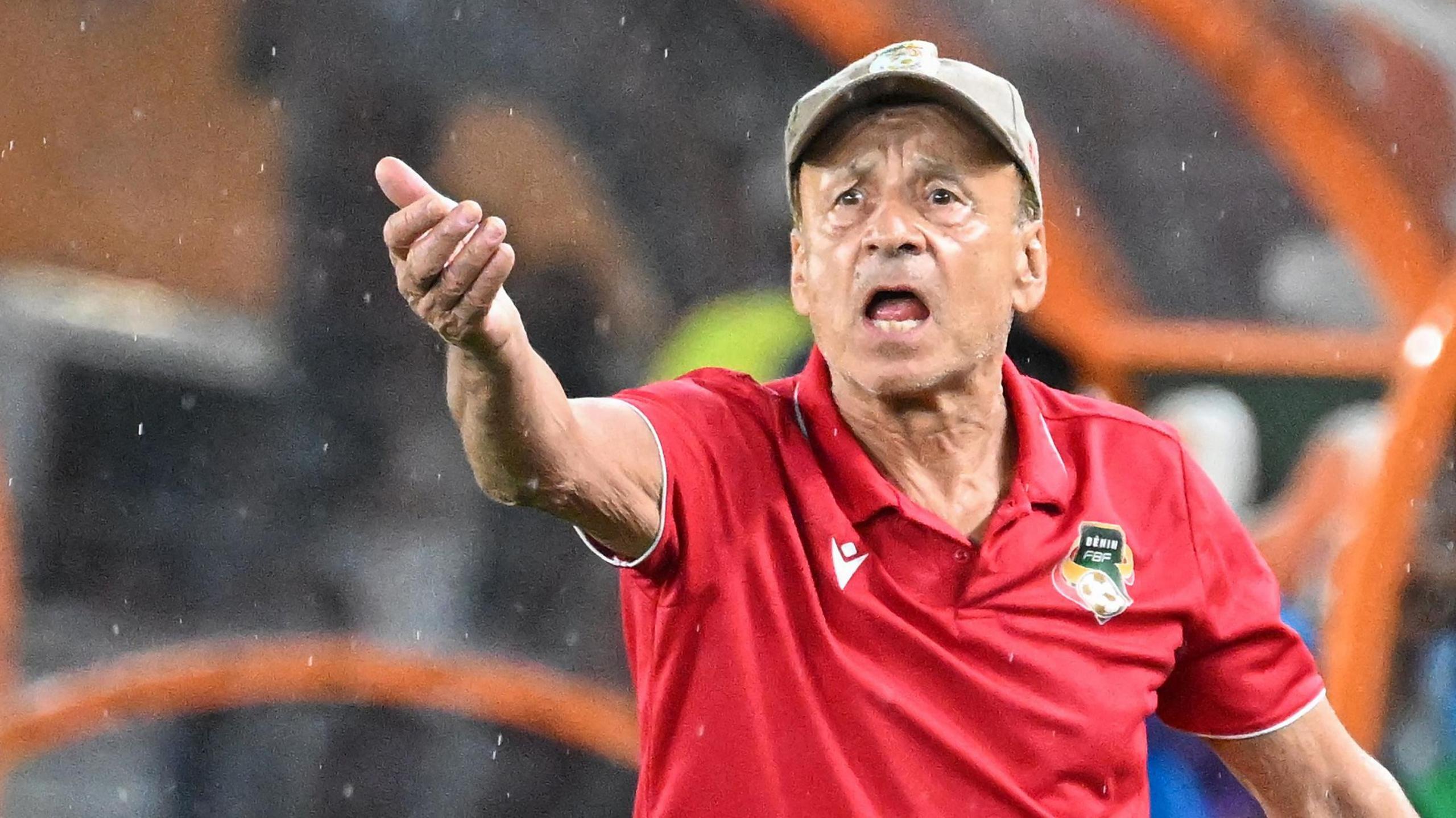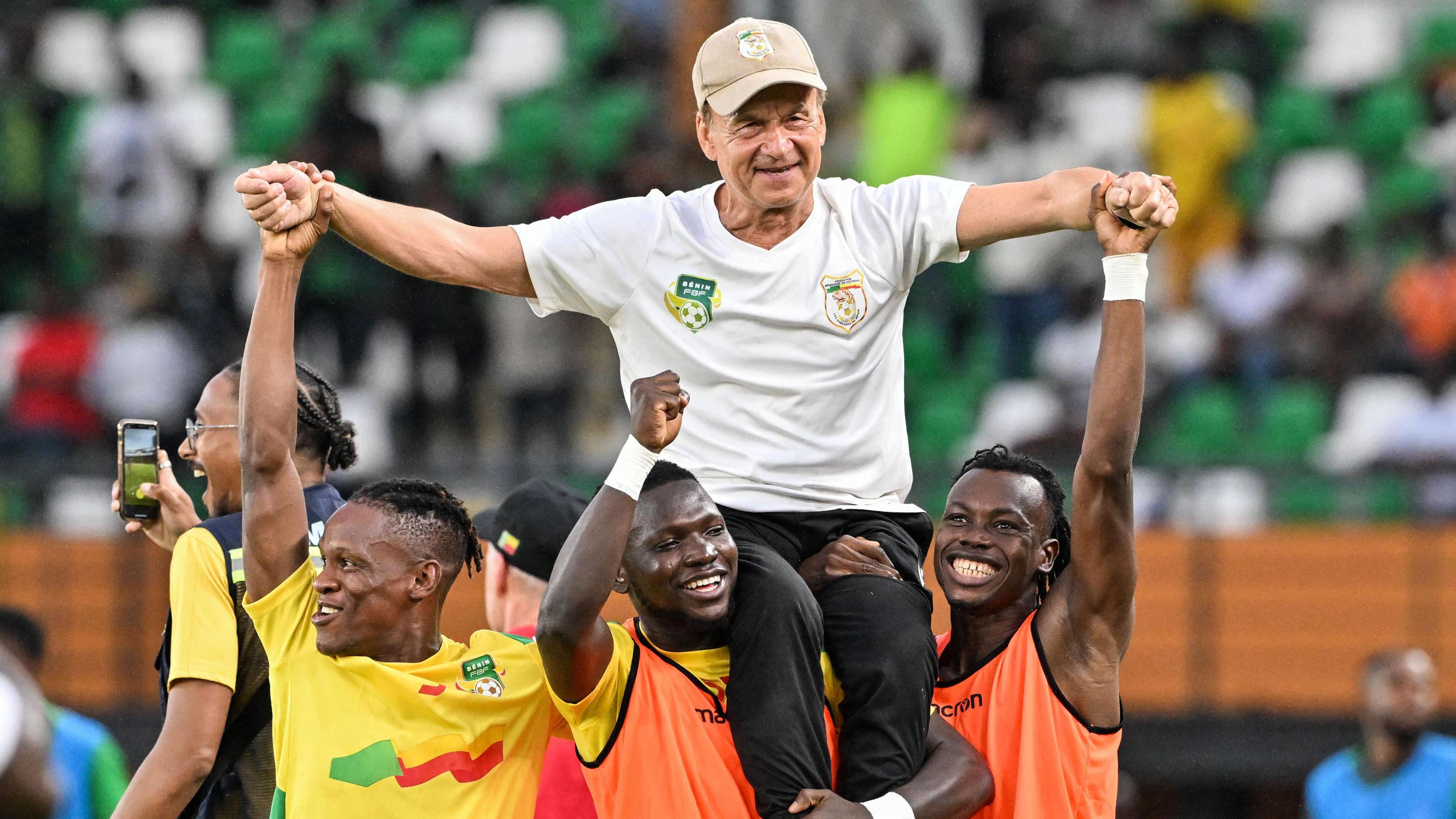'Traumatised' Rohr wants Libya sanctioned

Gernot Rohr has coached Gabon, Niger, Burkina Faso, Nigeria and Benin during his time working in Africa
- Published
Gernot Rohr believes Libya should be sanctioned after the Benin coach and his team were left "traumatised" by the violent reaction of fans and security officers following last month's 2025 Africa Cup of Nations (Afcon) qualifier in Tripoli.
The 71-year-old German required treatment on the team bus after being struck by a baton while other members of support staff are understood to have been involved in confrontations as the visitors were detained in their dressing room after full-time.
Libya went into the game knowing only a win would give them a chance of reaching next year's Afcon but the 0-0 scoreline at full-time meant Benin ultimately finished second behind Nigeria in Group D, securing their place at the finals in Morocco.
Rohr, a veteran of the game who has coached five African nations including Nigeria, says what followed was his worst experience working on the continent.
"What happened in Libya was really crazy," he told BBC Sport Africa.
"I have never experienced such a situation like after the match in Tripoli.
"It was a crazy reaction from the public and the policemen who came and attacked us. Imagine being locked in the dressing room. We were left traumatised.
"It is dangerous and unsafe for international matches to be played in a country where there is political instability, with no security, and could have easily led to a tragic outcome."
Libya country profile
- Attribution
- Published13 September 2023
'We should not wait for tragedy'
Following the end of Colonel Gaddafi's rule in 2011, Libya has suffered from violence and instability.
The country is currently split into two administrations, with different governments claiming authority in the east and west.
The two sides signed a ceasefire in 2020 - which eventually led to Libya being allowed to play qualifiers at home again from 2021 - but rivalries continue, and Rohr believes Africa's football authorities must do more to ensure the safety of visiting teams.
"I've never seen this before in all my years in African football, and no team in Africa deserves such a bad and dangerous treatment," he continued.
"We were attacked for no reason and we should not wait for a tragedy to happen.
"So I hope that Caf (Confederation of African Football) will do what they have to do to protect future teams who are going to be playing in Libya, and I hope they can play in a safe place."
The Libyan Football Federation (LFF) declined to comment but an official told BBC Sport Africa the country "is very safe".
However, after an investigation, Caf ordered Libya to play its next two games behind closed doors and imposed a fine of $50,000 (£39,700) because of the behaviour of spectators and officials.
Libya’s controversial campaign
While Libya went into the game against Benin with hope of reaching Afcon 2025, Rwanda’s unexpected victory over Nigeria ultimately meant even three points would not have been enough for them to qualify from Group D.
The Mediterranean Knights' chances of reaching the finals were effectively killed off when Nigeria were awarded a 3-0 victory by Caf following the cancellation of the teams’ fixture scheduled to be played in Benghazi in October.
The Super Eagles boycotted that match after their plane from Nigeria was diverted from its intended destination and the squad were stranded at an airport terminal overnight.
At the time, Nigeria Football Federation media manager Promise Efoghe said no LFF official came explain the situation, and described their experience as like being "in a prison at the airport".
Striker Victor Boniface said on social media that the squad were left without food, wi-fi or anywhere to sleep, while captain William Troost-Ekong labelled their treatment as "disgraceful behaviour".
A Caf disciplinary board subsequently ruled that Libya had breached two articles of its disciplinary code, as well as an article of the Africa Cup of Nations regulations.
The LFF has said it will "go to the highest levels of litigation" to overturn the sanction, meaning there could yet be a challenge to the outcome of Group D.
Libya criticises Nigeria amid Afcon qualifier boycott
- Published15 October 2024
Benin players 'very, very hungry'

Rohr and his Benin team celebrated a famous 2-1 win over Nigeria in World Cup qualification in June
Having booked a place at Afcon, Rohr has already turned his attention back to the ambitious target of qualification for the 2026 Fifa World Cup.
Despite their rise up the African football ladder in the mid-2000s, Benin remain a nation of modest resources, so the coach is putting his faith in youth.
"We have a lot of young and local players," Rohr explained.
"It is different from the other countries I had previously managed in Africa. We have half of the team under the age of 21 and 22, half of the team coming from the local league.
"That is the opposite of what I had in Nigeria, where everybody was playing in big teams, big clubs and big leagues.
"The difference is they are very, very hungry. They want to make a successful career and that's why the ambition is very big, and it's a special work for the coach."
Benin first played at an Afcon finals in 2004, followed by appearances in 2008, 2010 and 2019.
The Cheetahs have never qualified for the World Cup, but Rohr believes their recent continental success is "giving confidence" to his players as they look to make history.
After four games in qualifying, they currently sit third in Group C with seven points - only behind leaders Rwanda on goal difference and second-placed South Africa on goals scored.
Rohr's former team, Nigeria, are languishing in fifth position with just three points.
The campaign restarts in March with a trip to Zimbabwe followed by a home fixture against South Africa.
Rohr’s message remains that "everything is possible".